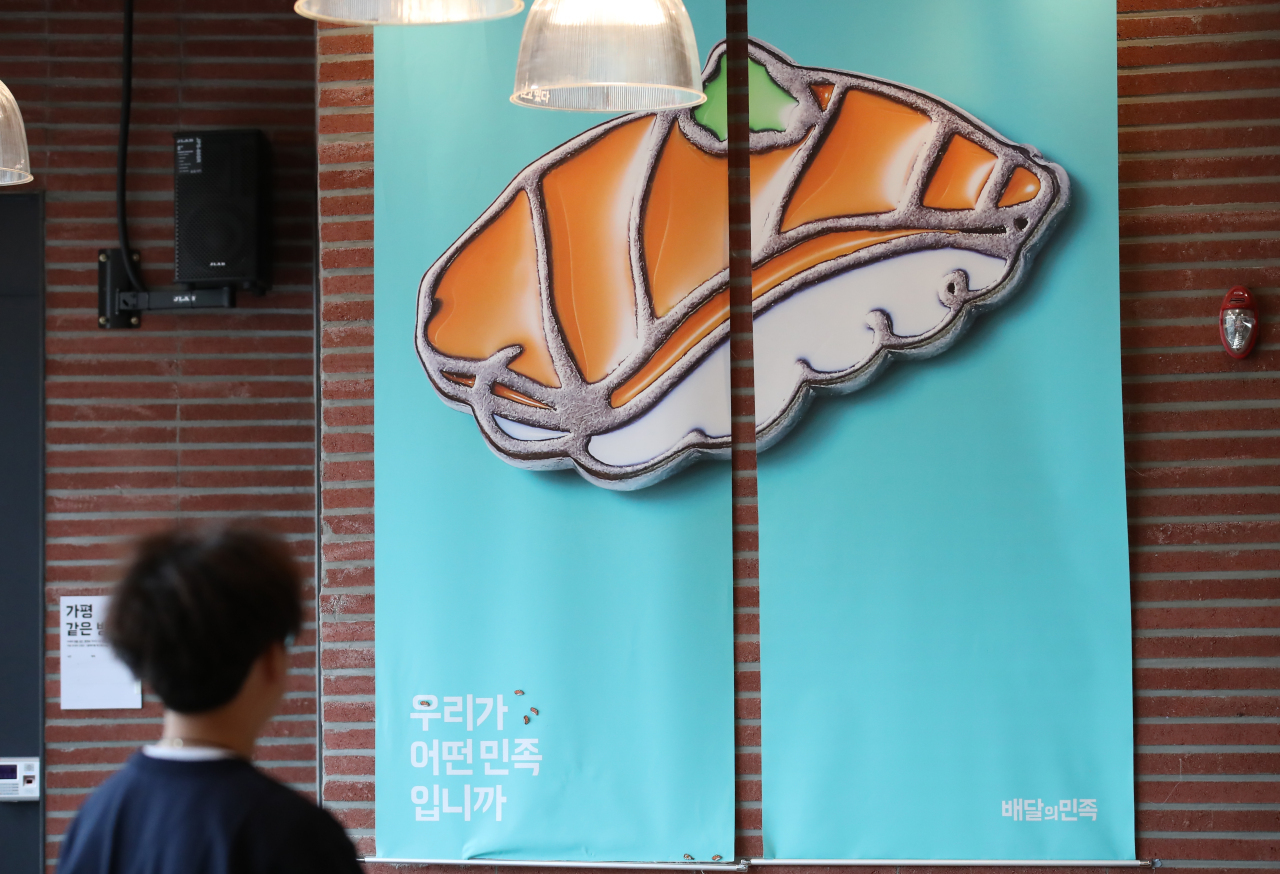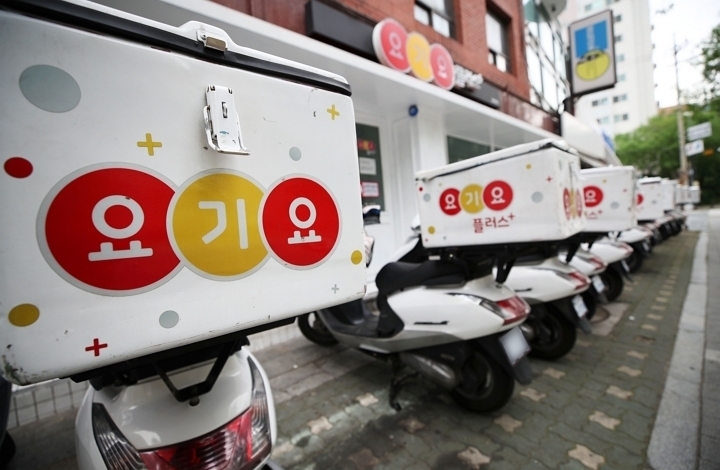No one’s really happy with food delivery platforms anymore
Consumers, restaurateurs complain about rising costs; Platform operators hemorrhage money; riders cry foul over working conditions
By Park Han-naPublished : Aug. 22, 2022 - 15:23


When food delivery platforms first emerged, they were hailed as an innovative new business that would bring convenience to our everyday lives.
With just a few taps, foodies were able to enjoy a wide range of dishes delivered right to their doorsteps. Small restaurants could reach a much wider pool of customers. People got jobs as delivery riders. Delivery startups were the darlings of the capital market, receiving huge investments.
But after a decade of living with Baedal Minjok, Yogiyo and, more recently, Coupang Eats, many seem to question whether these apps have improved things.
Kim Seung-june, 32, is skeptical after a recent experience.
Preparing for a housewarming party, he browsed the Baedal Minjok app for fried chicken and bossam, a Korean pork dish. The food from the two different restaurants came to a combined total of 50,000 won ($38.16), but the delivery charges amounted to one-fifth of that -- 10,000 won.
“I ended up collecting the food from the restaurants myself. I knew delivery fees were soaring, but it was too much,” he said.
Surveys suggest that customers who have lost their appetite for food delivery had similar reasons.
A poll commissioned by the Seoul Institute and conducted in March found that about 52 percent of Seoul citizens who did not use delivery services in the first quarter of this year cited the economic burden from the rising food and delivery costs.
The average cost of food delivery in Seoul in May has increased by about 12 percent compared to March, according to data from the Korea National Council of Consumer Organizations. The cost of delivering a meal for a single person has gone up by more than 40 percent, it showed.
Restaurant owners are also complaining about the rise in the commission fees they pay on orders received via delivery platforms.
“The profit margin on deliveries is small. Orders for a single serving generate hardly any profit,” said Kim Sung-hwan, who runs a small American Chinese restaurant in Mapo-gu, Seoul, adding that he would suspend delivery services if he had a sufficient number of customers who place orders directly to the restaurant.
Oh Eung-kyung, who opened a dessert cafe in the Seongbuk district in November last year, said one-third of what customers pay via delivery apps goes to the platforms in the name of various charges, such as advertising and subscription fees.
“During the first three months of opening, I only charged customers 2,000 won for each delivery. With that, the profits were not enough for the work I put in,” she said. Oh added that she delivers coffee to locations close to her store to save costs.
What customers pay for delivery fees doesn’t cover the full cost of hiring a rider to fulfill the order. Restaurant owners usually shoulder a part of the actual delivery costs incurred in order to attract more customers, on top of paying commissions to the platforms.
So are delivery platforms raking in profits? Not really.
Woowa Brothers, the operator of Baedal Minjok, posted 2 trillion won in revenue in 2021, nearly double that of a year earlier as the prolonged COVID-19 pandemic pushed up demand for food delivery. But its operating loss soared nearly sevenfold to 75.7 billion won over the same period.
Coupang Eats logged 3.5 billion in operating losses in 2021. Unlisted Yogiyo is not required to disclose earnings but its profit structure is not much different from its competitors.
The food delivery market has grown rapidly since the COVID-19 pandemic started. According to Statistics Korea, it was valued 25.7 trillion won last year, 2.6 times bigger than in 2019.
While announcing its 2021 earnings in late March, Baedal Minjok said that losses are a result of outsourcing, mainly the expenses it pays to delivery agents. It spent some 574 billion won on outsourcing services last year, a huge jump from 181 billion won in 2020.
Increased competition among platforms has created a vicious circle.
Apart from big-budget advertisements and promotions, the jump in outsourcing expenses was mainly driven by the introduction of single-meal options on Baedal Minjok and Coupang Eats. Handling just one order at a time, riders could deliver individual orders more swiftly when compared to bundled deliveries involving multiple orders delivered to multiple locations in one journey. But single-meal delivery means the platforms need more agents to fulfill orders. The platforms rushed to recruit riders with rewards and incentives, resulting in a huge increase in related costs.
So has the rise of food delivery apps made the lives of delivery workers better?
Pay and conditions have certainly improved, but there is still widespread dissatisfaction. Trade unions have long claimed that delivery workers are one of the least protected groups in the current economy. Working mostly as gig workers, riders are entitled to little to none of the work-related benefits workers usually get. Their plea for better protection has sparked discussion in South Korea over the conditions for workers in the gig economy.
Baedal Minjok and Coupang Eats, after a long tussle with delivery unions over working conditions, such as the absence of insurance coverage for traffic accidents, have decided to hire full-time delivery workers. The latest demand from unions is a larger portion of delivery fees.








![[Graphic News] More Koreans say they plan long-distance trips this year](http://res.heraldm.com/phpwas/restmb_idxmake.php?idx=644&simg=/content/image/2024/04/17/20240417050828_0.gif&u=)
![[KH Explains] Hyundai's full hybrid edge to pay off amid slow transition to pure EVs](http://res.heraldm.com/phpwas/restmb_idxmake.php?idx=644&simg=/content/image/2024/04/18/20240418050645_0.jpg&u=20240419100350)






![[From the Scene] Monks, Buddhists hail return of remains of Buddhas](http://res.heraldm.com/phpwas/restmb_idxmake.php?idx=652&simg=/content/image/2024/04/19/20240419050617_0.jpg&u=20240419175937)

![[KH Explains] Hyundai's full hybrid edge to pay off amid slow transition to pure EVs](http://res.heraldm.com/phpwas/restmb_idxmake.php?idx=652&simg=/content/image/2024/04/18/20240418050645_0.jpg&u=20240419100350)

![[Today’s K-pop] Illit drops debut single remix](http://res.heraldm.com/phpwas/restmb_idxmake.php?idx=642&simg=/content/image/2024/04/19/20240419050612_0.jpg&u=)